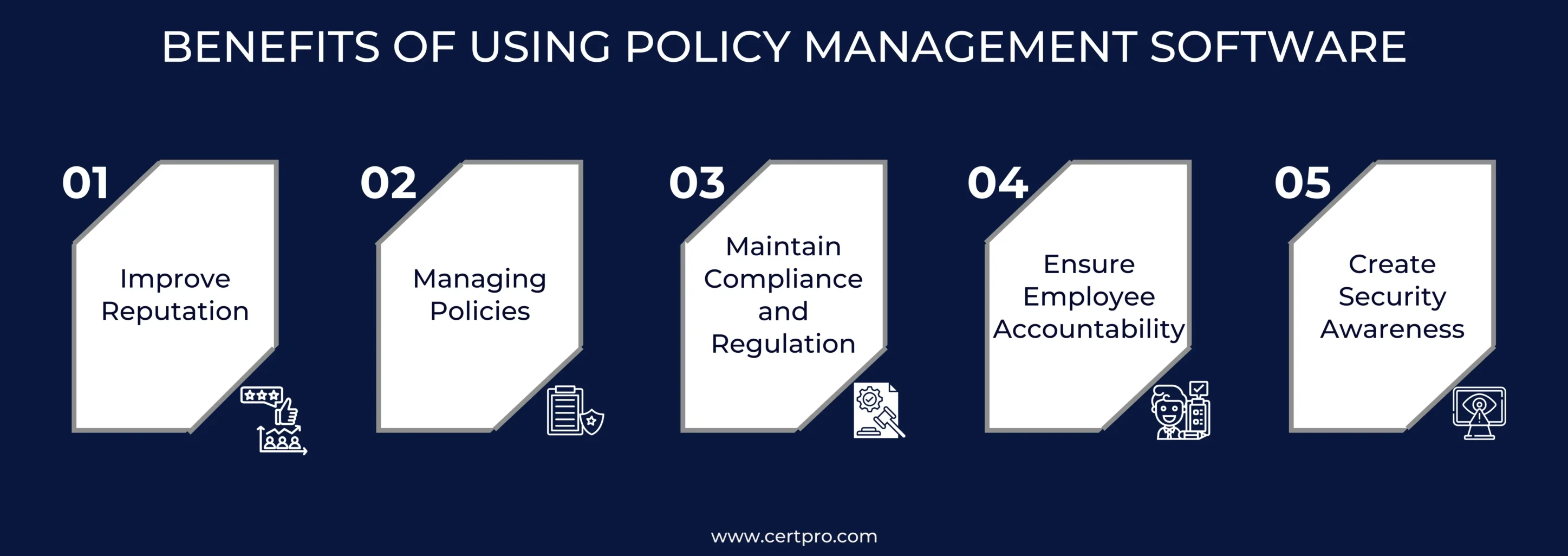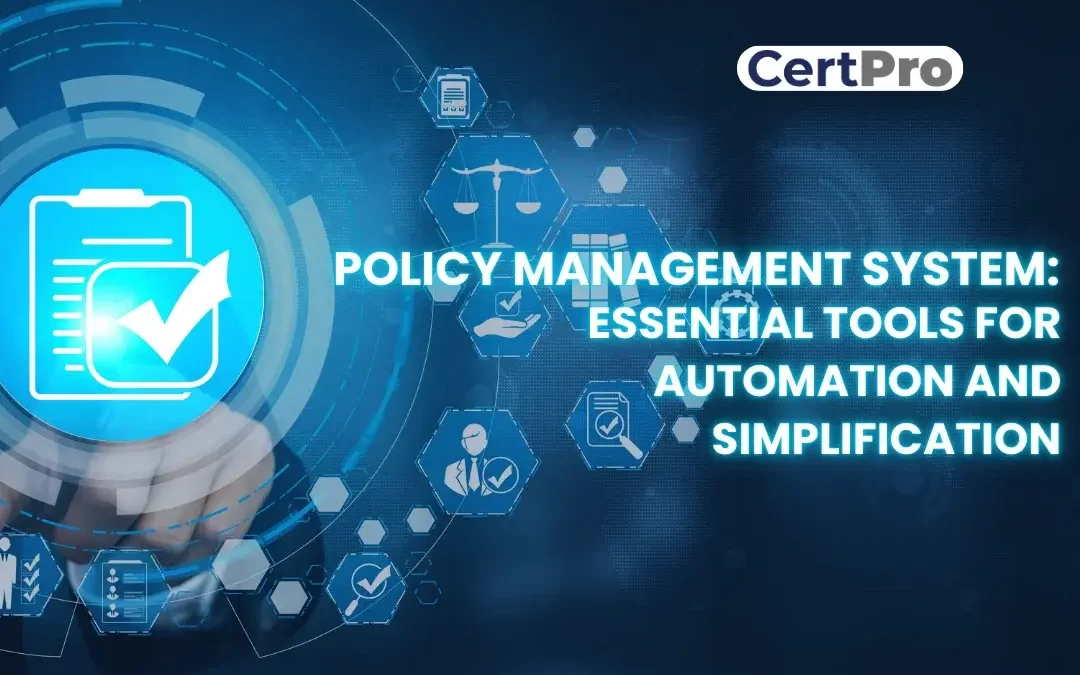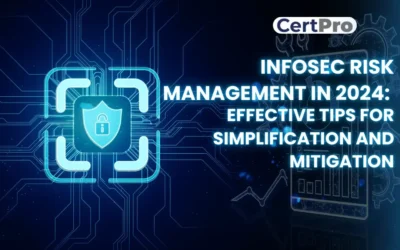Growing businesses indicates that you become a master in your field and accurately manage all business-related policies. However, managing company policies can be daunting significantly when your business expands. Here, an effective policy management system can help you to secure compliance practices and eliminate the risk of errors. In the case of middle- to large-scale industries, manual handling increases operational mishaps and confusion. In such cases, policy management software can save time and effort. Simply put, policy management systems automate the policy creation, distribution, and tracking process to reduce risks and errors.
This blog will dive into the details of policy management systems, the benefits of policy management software, how it streamlines compliance practice, and what features need consideration in selecting the software. Read the article to get a conclusive idea about policy management.
WHAT IS A POLICY MANAGEMENT SYSTEM?
BENEFITS OF USING POLICY MANAGEMENT SOFTWARE
POLICY MANAGEMENT SOFTWARE IN COMPLIANCE
HOW POLICY MANAGEMENT SYSTEM STREAMLINES COMPLIANCE PROCESSES
KEY FEATURES OF SELECTING THE RIGHT POLICY MANAGEMENT TOOL
IMPLEMENT POLICY MANAGEMENT TO STREAMLINE YOUR COMPLIANCE JOURNEY
WHAT IS A POLICY MANAGEMENT SYSTEM?
A Policy Management System (PMS) is a cloud-based software that allows you to view everything from one place. Compliance and cybersecurity rules are essential to follow in today’s world. A statistical review showed that 80% of UK businesses have rules for data storage. All middle-sized to large companies in the US have laws in place to protect their data. As a result, policies share knowledge on meeting regulatory requirements and teaching employees the best ways to perform things. However, policies and procedures must change when laws change.
Pillars of a Policy Management System: The PMS acts like a policy document management platform. It will manage, distribute, and track your company’s ongoing policies. In addition, it stands on three main pillars:
Cloud-Based: The PMS is a cloud-based operating process that offers a centralized pivot to store and manage policy content. The process adds a layer of control over versions, storage, and release and ensures that only the most recent policy interpretation is used.
Integrated Accountability: Accepting and approving policies is vital to the policy management system. It is a centralized, automated, and shareable
service that informs employees and partners about the latest policies. The process uses digital signatures and auditing features to ensure accountability.
Measure and Improve: A PMS can audit policies to ensure your company’s policies are always up-to-date and secure. The system must be simple to use and able to keep track of policy changes. Thus, the team working with the policy documents must recognize the changes in the existing policies.
BENEFITS OF USING POLICY MANAGEMENT SOFTWARE
It is a centralized, automated process that helps in risk management. However, it has multiple other benefits like:
Improve Reputation: Customers’ mindsets have changed, and now, privacy is essential for them. An effective policy management system helps to maintain compliance practices and avoids the risk of litigation. Thus, it assists in maintaining brand reputation and customer trust. A policy management tool ensures data security and privacy that fulfill customers’ expectations.
Managing Policies: Manual policy documentation can be troublesome and comparatively expensive. However, a cloud-based policy management software can save money and effort in the long run. The process requires less effort as the system efficiently manages a policy’s lifecycle, audits it, and ensures that employees follow the guidelines. Moreover, it offers a central console to manage and handle the policies.
Maintain Compliance and Regulation: A PMS offers a centralized management of policies that helps in data protection and regulation updates. The system updates the policies quickly and is reissued to employees. It is possible to record an agreement with any changes by digital signing. Therefore, using a centralized management system to handle policies makes it easy to show proof of compliance quickly in the form of documents. In other words, a PMS gives you the documents of an audit trail to ensure you follow the industry-specific rules.
Ensure Employee Accountability: A sound Policy management informs employees about essential policies and encourages them to follow them by sending automated messages. With digital policy signing, the system ensures the employee reads, understands, and agrees to the company’s security rules. The automatic system keeps track of policies for making, distributing, and upgrading. Digital signing lets employees confirm that they agree with the existing policies. This process shows that your workers know your company’s rules and are responsible for following them.
Create Security Awareness: The Policy Management System can make metrics that measure security understanding and compliance. This lets officials know your company fully involves its employees in policy standards like data privacy and security practices. A good Policy Management System is essential to keep your policy documents updated. So, providing proof of security awareness training through unified policy management can help with compliance.

POLICY MANAGEMENT SOFTWARE IN COMPLIANCE
Implementing compliance is difficult, while managing them with changing regulations is more challenging. Therefore, an effective PMS is a strategic solution for managing risks. The system ensures that the policies are constantly followed and maintained. Let’s discuss some more points on the role of PMS in compliance practice:
Automated Policy: Policy management software does all the steps of policy management systems effortlessly, which changes how policies are handled. The software speeds up the process so employees can review, accept, send out, and understand policies more quickly.
Drafting: The software comes with themes and other tools that make the writing process more consistent and thorough. It also has tools like version control and collaborative editing that make it easy for many people to work together on policy drafts and improve them.
Review: Automated processes send policy drafts to the right reviewers for a thorough review of all documents.
Approval: After being reviewed, policies are sent automatically to people who are supposed to accept them. For accountability and openness, it is essential that the software keeps track of approvals and gives a clear audit trail that shows who approved the policies.
Distribution: The software then sends the approved policies to the right employees. Thus, ensuring everyone has access to the most recent versions is possible through email, internal sites, or direct links in the software itself.
Attestation: Employees can digitally sign or confirm that they have read the policies. The software keeps track of these signatures so managers can see who has followed the rules.
Storage and Access of Policies: With a robust policy tool, you can access and store policies in one centralized location. This helps employees understand the policy details, comply with company policy, and demonstrate that they follow it correctly.
Policy Distribution and Tracking: The automated process tracks how policies are sent to employees and how many have read and acknowledged them. This ensures that every employee at your company understands the rules that must be followed, lowering the chance of non-compliance and human errors.
Align Policies with Regulatory Changes: Software often monitors changes to rules and ensures that policies are still relevant. Businesses that take this proactive approach are more likely to meet compliance requirements on time, avoid fines, and maintain a reputation with regulatory bodies.
Consistent Policy Enforcement: The software solution centralizes policy management to ensure that policies are consistently enforced the same way across the company. It helps maintain a standard approach to compliance, reducing differences and ensuring that all areas follow the same rules.
Offer Training and Awareness: Policy management systems include training tools that help employees determine how to use them. You can track regular training modules, improving overall compliance and lowering the risk of policy breaches caused by ignorance.
Enhance Business Opportunities: As the organization grows, compliance requirements are also enhanced. Thus, policy management software can grow with your business, allowing you to manage policies and employees without losing control or efficiency. This scalability ensures that safety is still easy to operate as the company grows.
Ensure Continuous Improvement: Policy management software has data analytics and reporting capabilities that offer an in-depth overview of policy adherence and trends. Thus, the analytics can help you identify system vulnerabilities and optimize the policy management process, which ultimately helps your compliance practices.
Eliminate the Risk of Error: Humans can make mistakes when managing policies manually, leading to non-compliance and other difficulties. This is less likely with policy management software because the automation process checks for accuracy and lowers the chance of errors.
Improve Communication with Stakeholders: The software makes it easier for stakeholders to review and approve policies. Therefore, correctly understanding policies helps meet business goals and regulatory requirements.
Provide Audit Readiness: A policy management system can help a business prepare for an audit by keeping track of policy changes, approvals, and staff acknowledgments. This ensures that all the essential documents are easy to find during the audit, speeding up the process and showing that rules are followed.
HOW POLICY MANAGEMENT SYSTEM STREAMLINES COMPLIANCE PROCESSES
A policy management system is a complete way to monitor company policies. Therefore, companies can ensure employees can access the most up-to-date policies to avoid non-compliance risks. It streamlines the compliance process in the following way:
- It centralized the policy document process and enabled employees to access the policies and references easily.
- The system reduces the use of outdated and incorrect information during the practices.
- The digital signing concept ensures that employees read and understand the policies, which is essential in compliance audits.
- The policy management tool helps in the development and approval process of new policies.
- The automated process ensures that the stakeholders understand the policies and share their input on the policy-making process.
- Overall, the software speeds up the policy creation process and reduces the risks in workflow management.
- Automated processes and reminders ensure policies are reviewed on time and any necessary changes are made quickly.
- Software for policy management makes things more open and accountable, which lowers risks. This is a critical audit trail for compliance checks because it keeps track of all policy changes and updates.
- The software makes training and marketing campaigns more accessible. Connecting to learning management systems can ensure that employees receive the training.
KEY FEATURES OF SELECTING THE RIGHT POLICY MANAGEMENT TOOL
Selecting the right policy management software to keep your company compliant and running smoothly is essential. Here are some essential tips to help you choose the best tool:
- The system should centralize and categorize policies, making them easy to find and refer to audits. Most importantly, it should reduce the complexities of manual processes.
- Ensure that the policy database is accessible and that employees can easily access and follow it. Thus, easy access improves compliance adherence.
- Compare the tool’s features with policy lifecycle management, version control, automated processes, and security.
- The policy management software must be able to share specific policies quickly with internal and external stakeholders. This helps maintain compliance transparency and avoid legal issues.
- The system should record details about who has read a policy, which can reduce administrative work and ensure that all employees are aware of and follow the guidelines.
- Open for the short-listed tools demo; free trials help you understand the software’s functionality and use. If you do not have the right software, you could face compliance gaps that cause problems, fines, or even claims in the worst cases.
Here are some other criteria that need consideration while you select the software:
- The policy management system must be cost-effective and easy to use.
- The system must have a 24/7 customer support team and a central storage process.
- There should be enough training and an onboarding process before starting the process.
- The system must have acknowledgment tracking, lifecycle tracking, and version control.
- It must be integrated with your existing programs and policies.
IMPLEMENT POLICY MANAGEMENT TO STREAMLINE YOUR COMPLIANCE JOURNEY
A policy management system can help your company avoid problems caused by implementing compliance. Businesses can improve their processes and make changes that are good for their business with the help of these tools. Automation makes it easier to get to current policies, find weak spots, and lower risks. In this way, a sound PMS can change how your company handles risk. However, selecting the best policy management tools and systems for your business is essential.
Furthermore, select multiple software and sign up for their demo to understand which one best works for you. An effective tool can help you set up a central location to store your company’s rules and help your employees stay updated on policies and changes.
FAQ
What is policy management in cyber security?
Security Policy Management is the process of identifying, implementing, and managing the rules and procedures that all individuals must follow when accessing and using an organization’s IT assets and resources.
What is the role of policy management?
Policy management ensures that company policies are up-to-date, properly enforced, and aligned with regulatory requirements, minimizing risk and promoting accountability.
What are the benefits of using a policy management system?
A policy management system automates the creation, distribution, and tracking of policies, reducing human error and ensuring compliance with regulatory requirements.
What does policy mean in the context of software?
In software, a policy refers to a formal guideline or rule that governs the use of technology and data management, ensuring compliance and security.
How can PMS help with audits?
It maintains detailed records of policy changes, approvals, and employee acknowledgments, ensuring easy access to necessary documents during audits.

About the Author
RAGHURAM S
Raghuram S, Regional Manager in the United Kingdom, is a technical consulting expert with a focus on compliance and auditing. His profound understanding of technical landscapes contributes to innovative solutions that meet international standards.
Risk Management in Healthcare: Strategies for Building Resilience
Healthcare data breaches show how vital risk management is in the healthcare industry. Cyberattacks happen in many parts of healthcare companies, so risk management is essential for security. Changes made to clinical and administrative processes are part of risk...
INFOSEC RISK MANAGEMENT IN 2024: EFFECTIVE TIPS FOR SIMPLIFICATION AND MITIGATION
In today's businesses, the value of information is no less than any asset a company possesses. However, consecutive cyberattacks and threats disturb the collecting and storing process of information. Thus, the incident of emerging cyber threats enhances the risk to...
TOP 9 RISK ASSESSMENT TOOLS FOR BUSINESSES IN 2024
Risk assessment helps organizations strengthen their security posture and recognize potential risks to their compliance processes. It also evaluates the severity of the risk and minimizes its impact on business operations. In addition, risk assessment tools are...




